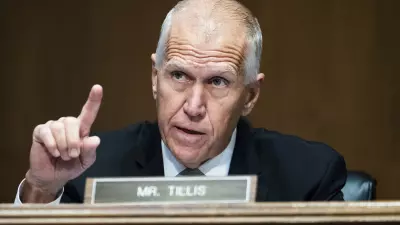Senate Republicans advanced a bill earlier this week that creates the new crime of “abortion trafficking” in Tennessee, subjecting any adult who helps a minor obtain an abortion without parental consent to mandatory jail time and potential civil lawsuits for the wrongful death of a fetus.

The bill passed 26-3 over forceful objections by Democrats who argued the measure’s ambiguous language could ensnare any trusted adult a pregnant minor turns to for “honest conversations” about their pregnancy, including a pastor, grandmother or step-parent.
Democrats also blasted the bill’s potential impact on incest victims, who could be forced to seek written permission from an offending parent, or the parent who failed to protect them from sexual abuse, before accessing an abortion.

“I just want to draw attention to the fact that what we’re doing is pretty outlandish here,” said Sen. Jeff Yarbro, D-Nashville.
“We’re saying that if a father rapes his child, and the child gets pregnant, that the parents still have to consent for that child to work with any adult to terminate that pregnancy,” he said.
The measure is intended to protect parents’ “God-given rights and state-given rights to protect their minors from obtaining an abortion,” the bill’s sponsor, Sen. Paul Rose, R-Covington, said in response to Yarbro.
The bill makes it a misdemeanor criminal act for any adult who “recruits, harbors, or transports a pregnant un-emancipated minor” to obtain an abortion, including an abortion-inducing drug, without written, notarized consent of the minor’s parent or guardian.
Violators would be subject to prosecution for a Class A misdemeanor with a mandatory 11 months and 29 days of incarceration. The punishment does not apply to a parent or legal guardian who aids a pregnant minor in obtaining an abortion.
The bill also says that adults “concealing” or “procuring” abortions are committing illegal acts – language that Yarbro called so “remarkably unclear” it could apply to almost anyone to whom a pregnant minor turns to discuss her options.
“Under the legislation as drafted, I’m not sure you can have an honest conversation with your grandparents, with your older sibling who’s an adult, with your priest, with your pastor, with an attorney, with a mental health provider,” Yarbro said. “The communications themselves are potentially a criminal act here.”
“We’ve never seen a court interpret ‘recruit’ or ‘harbor,’” Yarbro, an attorney, said. “They’re not defined in this statute. We’re just creating a mess.”
Yarbro’s attempts to amend the bill to exclude “trusted adults” in the pregnant minor’s life from criminal or civil liability was swiftly voted down.

In response, Rose said some of the language was crafted in response at Planned Parenthood, whose three Tennessee clinics were forced to cease abortions in 2022 but continue to provide abortion referrals to states where the procedure is legal.
“It is reported that Planned Parenthood was caught admitting that they assist underage girls or adults associated with them to skirt state laws and travel out of state without their parents’ knowledge or consent,” Rose said.
Sen. Raumesh Akbari, D-Memphis, asked if minors in the custody of the Tennessee Department of Children’s Services who had been sexually assaulted by a family member would also be subject to the law.
Yes, Rose responded. “My answer is going to be what the bill says. You have to have parental permission for an underage child to get an abortion.”
Parents of kids in state custody have typically lost the right to make decisions for their child, Akbari noted.
“I feel like we’re living in the Handmaid’s Tale here,” said Sen. Heidi Campbell, D-Nashville. “I mean, do we still live in a free country? It’s going to be the most vulnerable children that are the most harmed by this. Not all kids are in a position for various reasons to speak to their parents about issues like this.”
The bill also gives biological parents of a minor who got an abortion the right to pursue a wrongful death lawsuit against any adult who assisted them. A parent who impregnated his minor child is not entitled to pursue a suit, the bill language says.
The bill has yet to be considered or reconciled in the Tennessee House, where the bill language veers from the Senate version by creating a Class C felony, punishable by up to 15 years in prison.
Abortion has been banned in Tennessee since August 2022 after the U.S. Supreme Court ruling leaving abortion policy up to individual states. Only narrow exceptions exist for certain pregnancies that pose risks to the life of a mother.
Since then pregnant patients seeking abortions have left the state, often heading to clinics in nearby Virginia, Illinois and other states across the border.
A fiscal analysis of the bill by legislative staff found that between 2019 and 2020, prior to Tennessee’s abortion ban taking effect, an average of 507 abortions each year were performed on minors in Tennessee.
Tennessee is not alone is seeking to prevent minors from traveling out of state for abortion care without express parental consent. Alabama, Mississippi and Oklahoma have introduced similar bills this year that also criminalize adults who aid them, according to the Guttmacher Institute.
Mississippi’s bill was tabled this year but lawmakers in Alabama and Oklahoma continue to debate their respective bills. Idaho last year enacted a similar law, since put on hold by a federal court pending a legal challenge to its constitutionality.
Anita Wadhwani is a senior reporter for the Tennessee Lookout. The Tennessee AP Broadcasters and Media (TAPME) named her Journalist of the Year in 2019 as well as giving her the Malcolm Law Award for Investigative Journalism. Wadhwani is formerly an investigative reporter with The Tennessean who focused on the impact of public policies on the people and places across Tennessee.
Now more than ever, tough and fair journalism is important. The Tennessee Lookout is your watchdog, telling the stories of politics and policy that affect the people of the Volunteer State.







